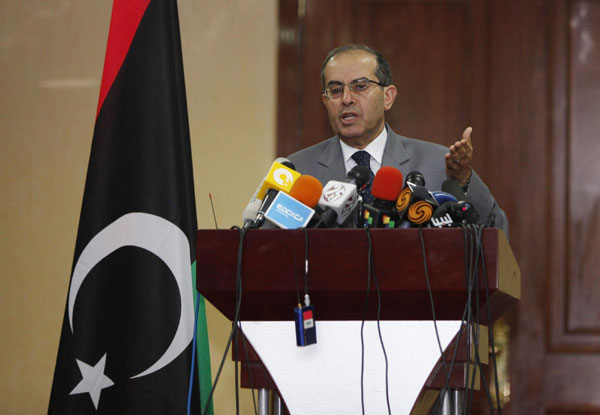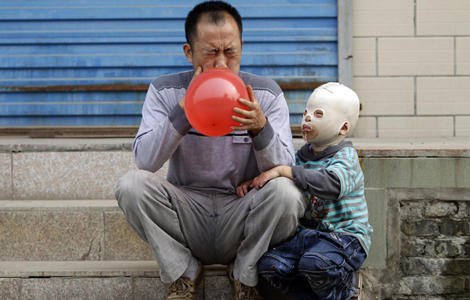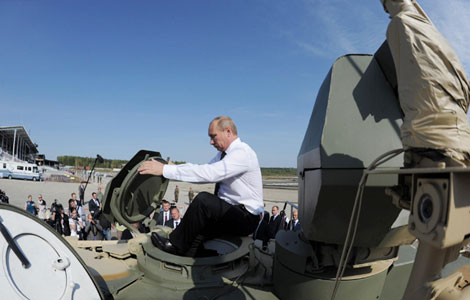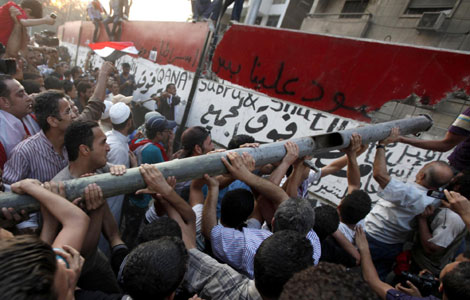Libya power struggle threatens post-Gaddafi unity
Updated: 2011-09-10 15:30
(Agencies)
|
|||||||||||
* Armed brigades jostle for role in new-look Libya
* Interim council sends mixed messages to brigades
* Fears foreign powers could back rival sides in power struggle
|
 Mahmoud Jibril, de facto prime minister of the National Transitional Council, speaks during a news conference in Tripoli September 8, 2011.[Photo/Agencies] |
TRIPOLI - Libya's internationally backed interim council has yet to establish a credible administration in Tripoli, where makeshift armed brigades united only by the six-month struggle against Muammar Gadhafi are now jostling for influence.
Elections are planned, but for now seem a distant prospect to the disparate fighters seeking a stake in Libya's future.
Mahmoud Jibril, de facto prime minister of the National Transitional Council (NTC), visited the Libyan capital on Thursday for the first time since Gadhafi's fall on August 23, accusing others of playing "political games" and threatening to resign if infighting erupted in the movement that overthrew Gadhafi.
The NTC has operated from the eastern city of Benghazi, the cradle of the revolt that erupted on February 17.
Fighting on the eastern front was bogged down for months until militias from the Western Mountains and the coastal city of Misrata finally turned the tables on Gadhafi's forces.
Those units have set up bases in Tripoli, spraying walls and cars with the names of their home towns. Some fighters wear bandanas and t-shirts with the name of their brigade. Unruly gunmen often fire into the air, unnerving Tripoli residents.
If this were not enough, some Libyans believe that France, Britain, Qatar and other countries that helped the revolt with cash, air power and diplomatic muscle now back rival camps.
"The situation is sensitive. Right now it's all a display of force .... I regret it," said Mousa Younis, speaking for a brigade of fighters from Jadu in western Libya.
These fighters, along with men from Misrata, which suffered a devastating siege by Gadhafi forces, feel their role in capturing Tripoli entitles them to a share in power.
"The Misrata and Jadu brigades are worried that new people will come from nowhere and try to take control, to steal the revolution. Who are these people?" asked Younis, whose fighters occupy a beach-side camp at a former Gadhafi-owned resort.
Alongside the brigades is an array of newly formed, and sometimes overlapping, councils and committees set up to administer the capital. Their authority is often disputed.
"They want to keep us out, but we will stay in Tripoli," said Mohammed al-Fortia, a Misrata commander. "If you have the power...they will respect you. We have the power, why not use it? Not to fight, but our presence is important."
MIXED MESSAGES
The NTC has sent mixed messages to the brigades camped in the capital, with some officials thanking them for their help, but gently asking them to leave, while others insist they stay, arguing that they still have a role with Gadhafi still at large.
The gunfire ringing out in Tripoli most days undermines efforts by Libya's new leaders to present a capital returning to normal and a country moving towards civilian, democratic rule.
Abdul Hakim Belhadj, an Islamist who once fought in Afghanistan, now heads Tripoli's military council. He must now impose order on former rebel forces, an NTC spokesman said.
"Belhadj has challenges in front of him. He needs to design a structure, amalgamate the forces, with the executive branch and the defence ministry," said the spokesman, Jalal al-Gallal.
But some brigades dispute Belhadj's authority, and now his military council is supposed to answer to a Supreme Security Committee for Tripoli that was set up this week.
"No one has asked us to leave. Some voices with their own agenda have asked us to leave," said Abdel Majid Mlegta, whose brigade hails from Zintan, south of Tripoli.
"Belhadj is a friend and a brother who has a brigade just like we do. It's the media that has exaggerated his position .... Everyone is singing their own tune. But the true words and operations are with the executive office of the NTC."
FOREIGN POWERS
The NTC is meant to rule only until elections are held and a constitution drawn up, but that process could be lengthy and will only start once Libya is declared "liberated".
NTC officials have not spelt out what is required for such an announcement, although some say Gadhafi must be killed or captured and pockets of Libya still loyal to him must surrender.
In this uncertain atmosphere, rumours fly, particularly tales of foreign involvement in the power struggle.
"Everybody's trying to get a piece of the pie. The French, the Qataris and the British .... They are giving financial and military backing and intelligence -- not necessarily on the enemy," said an NTC source who declined to be named.
France spearheaded the push for a UN resolution in March that allowed NATO warplanes to bomb Gadhafi's forces in the name of protecting civilians. The wealthy Gulf state of Qatar provided the rebels with cash, fuel and other assistance, while Doha-based news channel Al Jazeera championed their cause.
One senior NTC military official said privately that the Qataris were now supplying cash and weapons to Belhadj and another Islamist commander Ismail al-Salabi, who leads at least 3,000 fighters in the Benghazi-based February 17 brigade.
He said France was backing NTC chairman Mustafa Abdel Jalil and Jibril, who heads the NTC's cabinet.
Salabi this week called for the NTC to resign because its members are "members of the old regime".
SECULARIST VS ISLAMIST?
Jalil was Gadhafi's justice minister before resigning over the former leader's use of violence against protesters. Jibril once headed Libya's state economic think-tank under Gadhafi.
While his administration was not outwardly secular, Gadhafi cracked down hard on Islamists he saw as a threat.
Another NTC official said Qatar's support for more Islamist factions simply reflected their wider contacts in Libya.
"They can speak to all parties because there is no cultural or language barrier .... The French have mainly dealt with the secularists," he said, referring to the NTC leadership.
The antipathy felt by some towards members of the NTC can be lethal, judging by the July killing of Abdel Fattah Younes.
A reported secularist -- or at least non-Islamist -- Younes was Gadhafi's former interior minister before defecting to take command of rebel forces. He was killed after being taken into custody by his own side for questioning.
The NTC said last month it knew who the killers were, but would not identify them for fear of "damaging" the revolution, suggesting a dangerous rift in the anti-Gadhafi ranks.
Officials say Jalil and Jibril have delayed appearing in Tripoli because they have been busy rallying support for Libya abroad -- others suggest they are wary of moving to a city where deadly enemies may lie in wait.
- Egyptians break into Israeli Embassy in Cairo
- World took a stand after 9/11: Locke
- 11 dead in C China ferry sinking
- Birth defects still a challenge
- Ministry: China to further facilitate investment
- State Council demands spill probe
- Little role of NATO in anti-terrorism
- Internet major source of rumors: poll
Hot Topics
Libya conflict, Gaddafi, Oil spill, Palace Museum scandal, Inflation, Japan's new PM, Trapped miners, Mooncake tax, Weekly photos, Hurricane Irene
Editor's Picks

|

|

|

|

|

|







